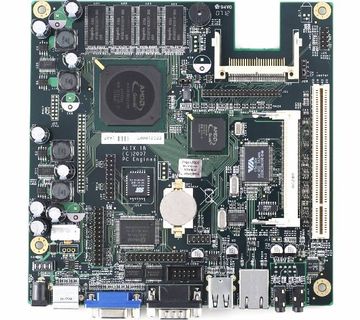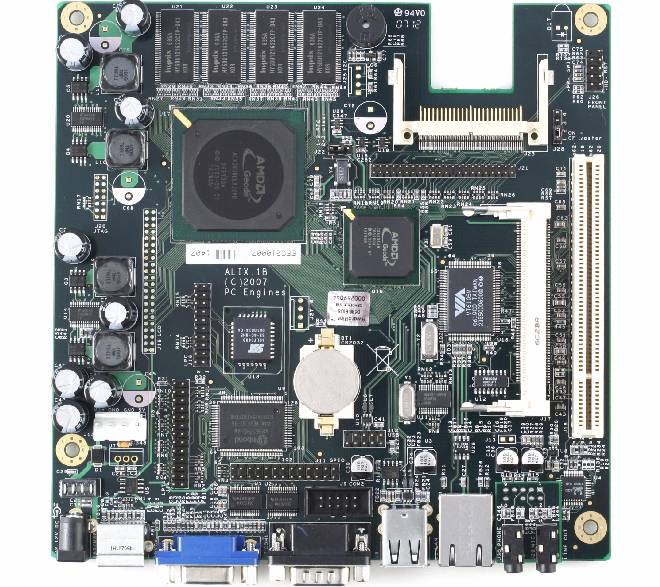Uit Hack42
| Project: ESpaceState | |
|---|---|
| Naam | ESpaceState |
| Door | BugBlue |
| Status | Uitvoer |
| Madskillz | solderen, C coden, GPIO, docs lezen, schroeven, spijkeren, debuggen |
| Doel / Omschrijving | |
| GPIO switches misbruiken om status van de space te detecten | |
| Alle Projecten - Project Toevoegen | |
De Alix.1C barPC heeft mplayer, aplay, en 21 GPIO switches pins. Deze pins kun je misbruiken om hier
en daar wat uit te lezen als je er een switch tussen zet.
Op dit moment zijn er 2 deuren voorzien van microswitches en 1 deur van bekabeling hiernaartoe.
De code draait als root op de barPC omdat het iets van privs nodig heeft op I/O ports. Chip docs op http://www.itox.com/pages/support/wdt/W83627HF.pdf
Code or it didn't happen
#include <stdint.h>
#include <sys/io.h>
#include <stdio.h>
#include <stdlib.h>
#include <time.h>
#include <unistd.h>
#include <signal.h>
#include <sys/wait.h>
#define PORT_INDEX 0x2e
#define PORT_DATA 0x2f
#define DEBUG 0
typedef unsigned char BYTE;
struct tm *local;
const char* toBin(const BYTE c)
{
static char buff[9]=" "; // auto 0 termination++
BYTE bit; // always wanted to do that.
for(bit=0;bit<8;bit++)
buff[7-bit]=(c>>bit) & 1 ? '1' : '0'; // eigtdoc
return buff;
}
void init()
{
outb_p(0x87, PORT_INDEX);
outb_p(0x87, PORT_INDEX);
}
void done()
{
outb_p(0xAA, PORT_INDEX);
}
void set(BYTE idx, BYTE val)
{
outb_p(idx, PORT_INDEX);
outb_p(val, PORT_DATA);
}
BYTE get(BYTE idx)
{
outb_p(idx, PORT_INDEX);
return inb_p(PORT_DATA);
}
/* Time to move away */
void leave(int sig)
{
done();
exit(sig);
}
// now do the damn thing
BYTE action(BYTE ot,BYTE byte,int bit,int pin,char *desc)
{
char cmd[50];
int tmp = bit & byte;
int docmd=0;
if(tmp==0 && ot==0) {
printf("%s: %s is open\n",asctime(local),desc);
sprintf(cmd,"./%d-open.sh",pin);
ot=1;
docmd=1;
} else if(tmp!=0 && ot==1) {
printf("%s: %s is closed\n",asctime(local),desc);
sprintf(cmd,"./%d-close.sh",pin);
ot=0;
docmd=1;
}
if(docmd) {
cmd[49]=0;
pid_t childpid = fork();
if (childpid >= 0) { /* we created a child (or is it called smurf) */
if (childpid == 0) { /* I'm tha smurf */
iopl(0); /* still running as root, but don't need the privs anymore */
exit(system(cmd)); // do your stuff and die
} else { /* I'm your daddy */
/* totally useless structure, but I wanted to type the above line */
}
}
}
return ot;
}
int main(int nargs, char **argv)
{
BYTE byte = 0;
time_t t;
t = time(NULL);
pid_t w;
int status;
(void) signal(SIGKILL,leave);
iopl(3);
init();
if(DEBUG) {
// check if OK - must be 0x52
byte = get(0x20);
printf("0x52 = [0x%02x] (%s)\n", byte, toBin(byte));
// check if GPIO11 is active
byte = get(0x2a);
if(DEBUG) printf("CR2A = [0x%02x] (%s)\n", byte, toBin(byte));
}
// set (and get) logical device to #7 - GPIO1 (GP10-17)
// GPIO next = #8 (GP20-26)
// GPIO next = #9 (GP30-35)
const BYTE devIdx = 0x07;
set(devIdx, 0x07);
byte = get(devIdx);
if(DEBUG) printf("LOGICAL DEVICE# = [0x%02x] (%s)\n", byte, toBin(byte));
// check GPIO1 functions [1:input, 0:output]
const BYTE funcIdx = 0xf0;
byte = get(funcIdx);
if(DEBUG) printf("FUNCTION = [0x%02x] (%s)\n", byte, toBin(byte));
// GPIO1 data
// Natuurlijk is GP10-17 (1 = open) GP20-26 (0=open) en GP30-35 (0=open)
const BYTE dataIdx = 0xf1;
BYTE ot1=0,ot2=0,ot3=0,ot4=0,ot5=0,ot6=0,ot7=0,ot8=0;
while(1) {
byte = get(dataIdx);
local = localtime(&t);
if(DEBUG) printf("DATA = [0x%02x] (%s)\n", byte, toBin(byte));
ot1=action(ot1,byte,1,1,"Voor-tussendeur");
ot2=action(ot2,byte,2,2,"Achter-tussendeur");
ot3=action(ot3,byte,4,3,"GPIO12");
ot4=action(ot4,byte,8,4,"GPIO13");
ot5=action(ot5,byte,16,5,"GPIO14");
ot6=action(ot6,byte,32,6,"GPIO15");
ot7=action(ot7,byte,64,7,"GPIO16");
ot8=action(ot8,byte,128,8,"GPIO17");
usleep(200000);
w = waitpid(-1, &status, WUNTRACED | WCONTINUED);
}
exit(1); // WTF do we do here?
}

